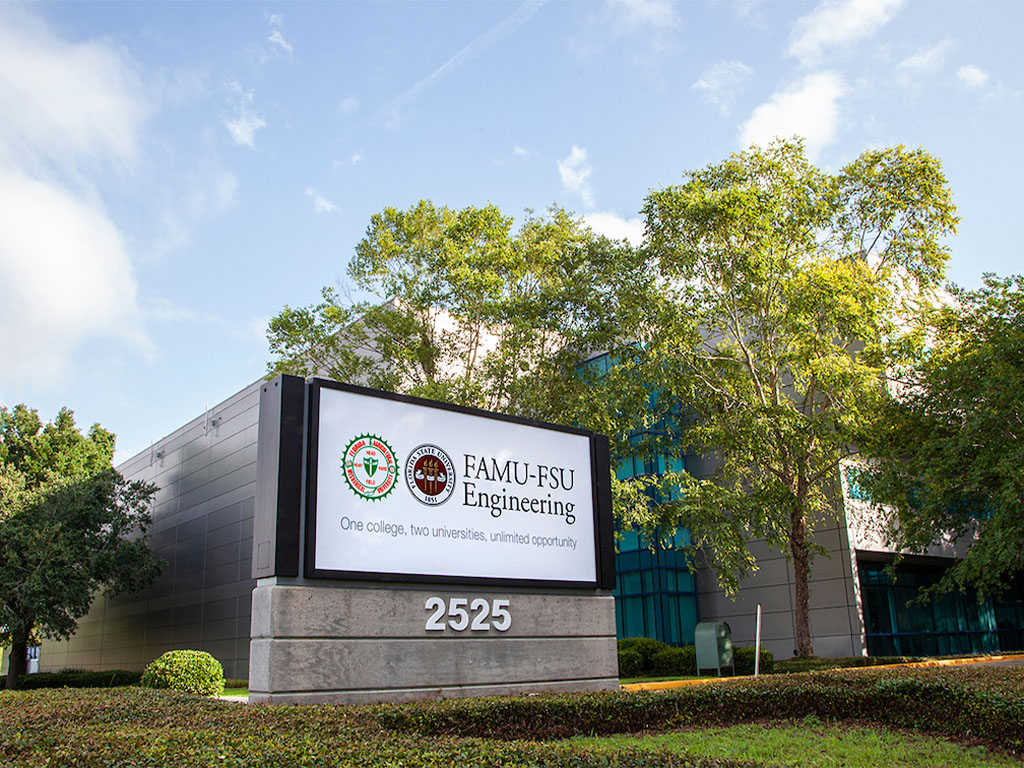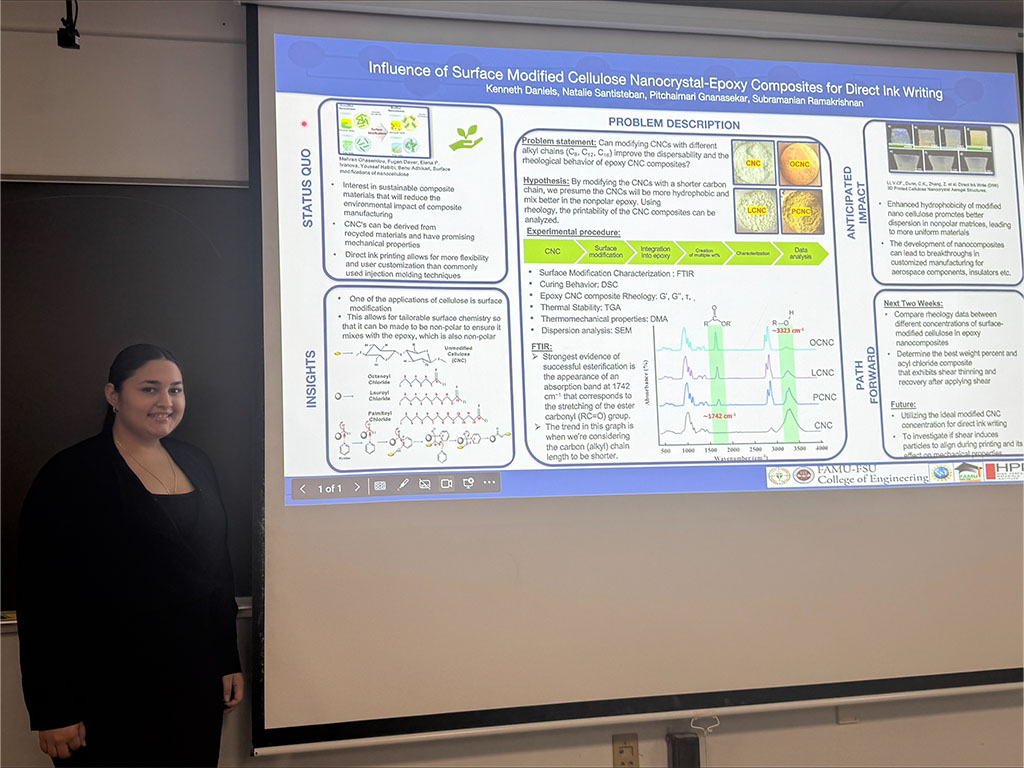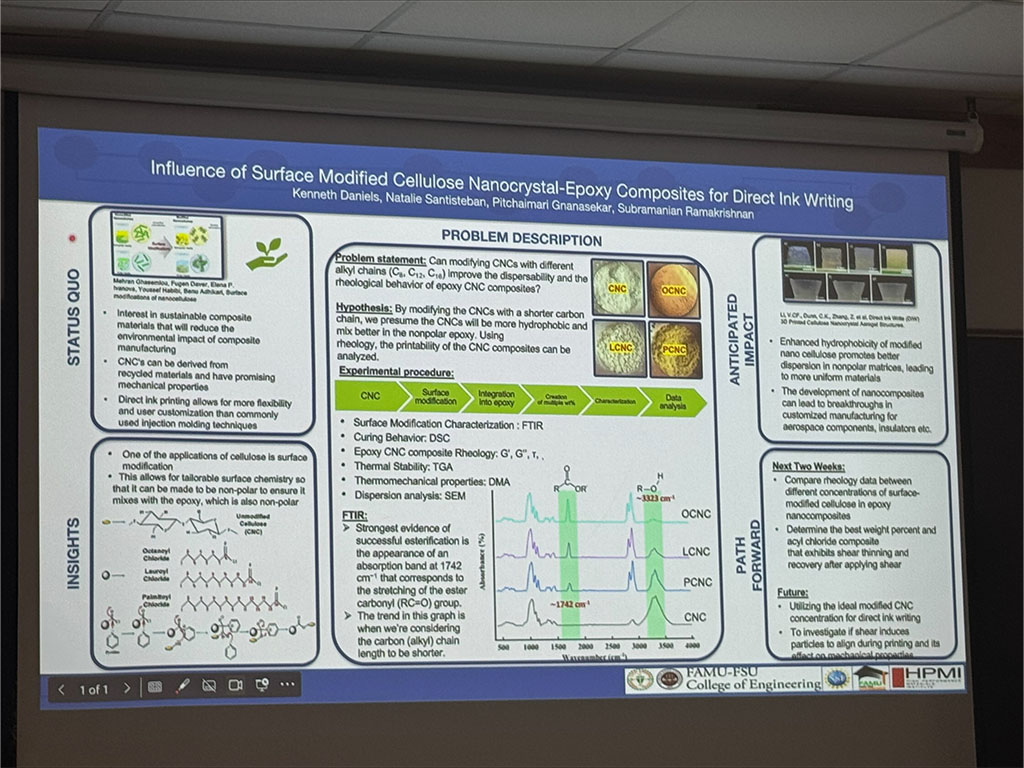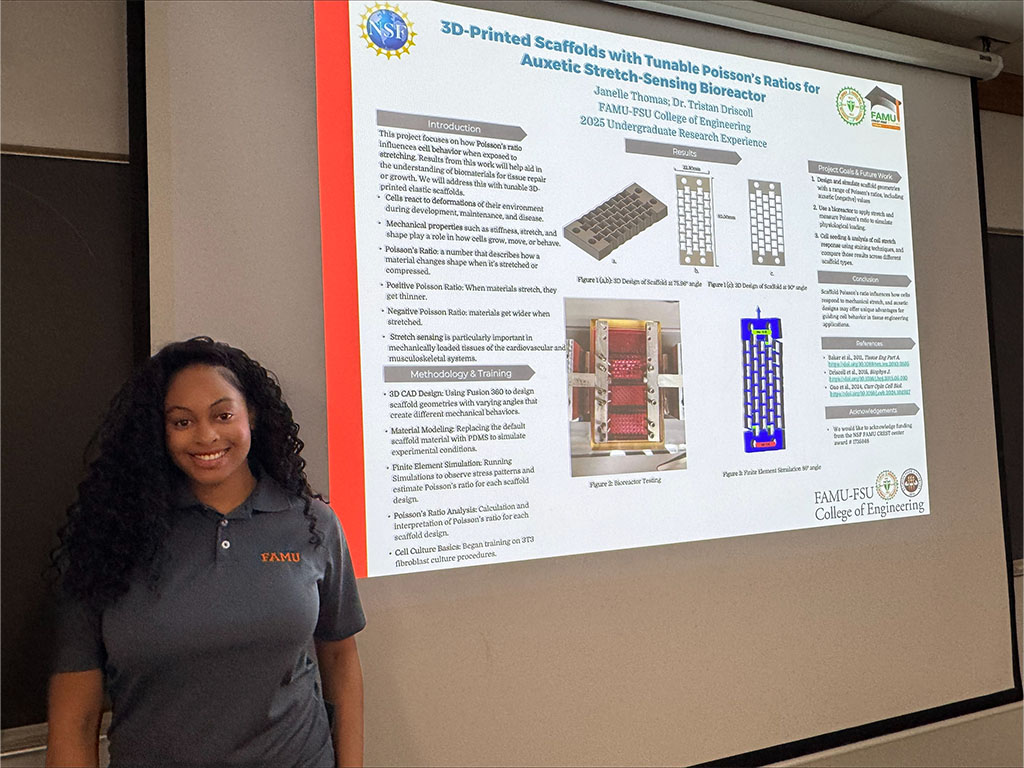FAMU-FSU College of Engineering Students Dive into Summer Research Through NSF-Funded REU Program

TALLAHASSEE, Fl. — More than 20 undergraduate students are spending their summer immersed in hands-on, faculty-led research at the FAMU-FSU College of Engineering as part of the Research Experience for Undergraduates (REU) program, funded by a $1 million National Science Foundation (NSF) grant.
The REU, part of the NSF’s HBCU-UP RISE initiative, is a competitive 12-week program that provides STEM and engineering students—particularly those from overlooked institutions and backgrounds—with real-world research experience in advanced scientific fields. Students are placed in various labs across the Innovation Park campus, including the National High Magnetic Field Laboratory, the Interdisciplinary Research Building and other high-tech facilities.
“This is often the first time many of our students are experiencing what it’s like to do research,” said Jamel Ali, Ph.D., co-principal investigator on the NSF grant and a faculty member in the College of Engineering. “They’re not just learning in a classroom—they’re working on real problems, exploring new technologies, and developing skills that can shape their academic and professional futures.”
Subramanian Ramakrishnan, Ph.D., the 3M distinguished professor and principal investigator for the NSF grant, also serves as director of the NSF CREST Center on Additive Manufacturing and director of the NASA Center on InSpace Manufacturing. He leads this transformative initiative through the Department of Chemical and Biomedical Engineering at the FAMU-FSU College of Engineering and the National High Magnetic Field Laboratory. Together, Ramakrishnan and Ali provide crucial mentorship and vision that drive the program’s success.
This summer’s cohort includes students from Florida A&M University, Florida State University, Tallahassee State College, Hillsborough Community College and Purdue University. Each participant receives a $7,000 stipend and is paired with a faculty research team in disciplines ranging from chemical and biological engineering to physics, chemistry and mechanical engineering.
For Natalie Santisteban , a rising senior from Orlando, majoring in chemical engineering at FAMU, the program is both familiar and transformative. Now in her second year participating, she is working on a project that focuses on surface-modifying cellulose into epoxy to create inks for 3D printing and direct ink writing.

Santisteban stands proudly in front of her research projects, showcasing her hard work and innovation.
“By altering the chemical bonds in cellulose, we’re creating composites that can be used in applications like aerospace components or insulation for wiring,” Santisteban said.
She said her journey into research has taught her persistence and adaptability.
 Exploring Santisteban’s research up close.
Exploring Santisteban’s research up close.
“There are days when your samples or experiments don’t turn out right, and you have to dig deep into journal articles to figure out what went wrong,” she said. “It takes a lot of motivation and discipline, but the experience has made me a stronger student and researcher.”
Santisteban hopes to pursue a career in pharmaceutical development. Inspired by her father’s battle with diabetes and her grandmother’s experience with Alzheimer’s, she has long been driven to improve the effectiveness of treatments and medications.
“I’ve always wanted to help people,” she said. “Even as a kid, I was curious about how medicine worked. This program has helped me build the foundation I need to turn that curiosity into a career.”
Janelle Thomas, a rising senior from Palm Beach, is majoring in biological systems engineering at FAMU. She is also making the most of her time in the program. Thomas’s project centers around 3D printing auxetic structures—materials that become thicker when stretched—for applications in tissue engineering.
 FAMU student Janelle Thomas presents her project.
FAMU student Janelle Thomas presents her project.
Thomas said her long-term goal is to combine engineering with medicine. While she once considered becoming a doctor, she now envisions herself in biotech innovation—developing technologies that support the medical field and improve patient outcomes.
“I want to help advance medicine, but from the engineering side,” she said. “This program is giving me the tools to do that.”
“Running the software was hard at first because it slowed my computer down a lot,” she said. “But after I got over that learning curve, I’ve been able to move faster and design more efficiently.”
Students in the REU program participate in a series of presentations throughout the summer, culminating in a final written report. They also receive support with résumé building, graduate school planning, and public speaking.
“This program isn’t just about lab work—it’s about helping students grow into confident, capable researchers,” Ali said.
The REU program also supports students from partner institutions like Tallahassee State College and Hillsborough Community College through sub-awards. As the four-year grant enters its final phase, organizers hope to extend the program’s impact.
“This program creates life-changing opportunities,” Ali added. “It connects students with resources, mentors, and experiences that can change the course of their careers.”
Media Contact:
Ashley Flete
Senior Communications Specialist
ashley1.flete@famu.edu
Latest FAMU News
- FAMU’s Irene C. Edmonds Youth Theatre Presents Original Hip Hop Musical, Wrestling with Angels<![CDATA[FAMU’s Irene C. Edmonds Youth Theatre Presents Original Hip Hop Musical, Wrestling with Angels]]>
- Rattlers on the Rise: Miami Native Finds His ‘Crowning Jewel’ Internship with STARZ<![CDATA[Rattlers on the Rise: Miami Native Finds His ‘Crowning Jewel’ Internship with STARZ]]>
- FAMU Named #1 HBCU for Online Programs by Forbes<![CDATA[FAMU Named #1 HBCU for Online Programs by Forbes]]>
- Florida A&M University Thanks Florida Governor and Legislators for Milestone Appropriation Year<![CDATA[Florida A&M University Thanks Florida Governor and Legislators for Milestone Appropriation Year]]>
- FAMU's Student Organizations Light Up the Stage at Summer Orientation Showcase<![CDATA[FAMU's Student Organizations Light Up the Stage at Summer Orientation Showcase]]>
- E.S.T.E.A.M.ED Summit at FAMU Uplifts Through Wellness, Leadership, and Technology<![CDATA[E.S.T.E.A.M.ED Summit at FAMU Uplifts Through Wellness, Leadership, and Technology]]>













